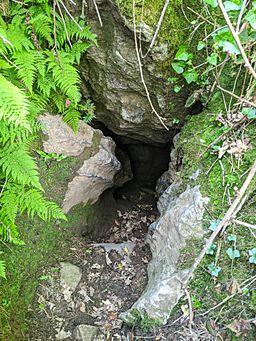Rod's Pot facts for kids
Quick facts for kids Rod's Pot |
|
|---|---|

Rod's Pot entrance
|
|
| Location | Burrington Combe, Somerset, UK |
| OS grid | ST 47215845 |
| Depth | 45 metres (148 ft) |
| Length | 188 metres (617 ft) |
| Geology | Limestone |
| Entrances | 2 (Bath Swallet) |
| Access | Free |
| Registry | Mendip Cave Registry |
Rod's Pot is an amazing limestone cave located high up in Burrington Combe. This area is part of the Mendip Hills in Somerset, England. It's a cool place to explore underground!
People first started digging into this cave in 1944. This work was done by a group called the University of Bristol Spelæological Society. They are explorers who study caves.
Rod's Pot is one of many "swallets" in the area. A swallet is like a giant drain in the ground where water disappears. Here, water from the Blackdown area flows underground. This happens where different types of rock meet.
Over time, more digging has connected Rod's Pot to another nearby cave called Bath Swallet. This means the cave system is even bigger than first thought! The cave was originally named Pearce's Pot after Dr Rodney Pearce.
Exploring Rod's Pot Cave
Rod's Pot is mostly made of tall, narrow passages. These passages formed along natural cracks in the limestone rock. Over many years, water slowly made these cracks much wider.
The main chamber inside Rod's Pot is very interesting. One of its walls is actually a continuation of a chamber in another cave called Read's Cave. Read's Cave is about a quarter mile to the west.
Inside the Passages
When you first enter Rod's Pot, the main chamber splits into two paths. Both of these paths are about 9 meters (30 feet) high and 12 meters (40 feet) long. They eventually join back together.
At the top of this meeting point, there's a deep hole. This vertical shaft goes down about 15 meters (50 feet) but it's a dead end. From the top of this hole, a passage about 9 meters (30 feet) long leads to the roof of the main chamber.
The main chamber itself is quite large. It's about 21 meters (70 feet) long and 6 meters (20 feet) high. The floor of this chamber slopes down about 12 meters (40 feet).
Cave Formations
Inside the main chamber, you can see some cool rock formations. There's a large stalagmite pillar. Stalagmites are rock formations that grow up from the cave floor. You can also see several stalactite curtains. These are like drapes of rock that hang down from the cave ceiling.
A small opening leads to another smaller chamber. This chamber is only about 0.6 meters (2 feet) high. Inside, there's a beautiful stalactite curtain about 2.4 meters (8 feet) long. This curtain is special because it's see-through (translucent). It also has cool stripes of reddish-brown colors!
From this small chamber, another passage leads to the very end of the cave. This is called the terminal pothole.
Unique Cave Life
Deep inside the cave, there's a spot called the Bear Pit. This is a 3-meter (10-foot) deep chamber that you reach through a small hole. At the bottom of the Bear Pit, there's a small pool of water.
This pool is home to a tiny creature called Niphargus fontanus. This is a type of small, blind freshwater shrimp. It's amazing to find life in such a dark and hidden place!

